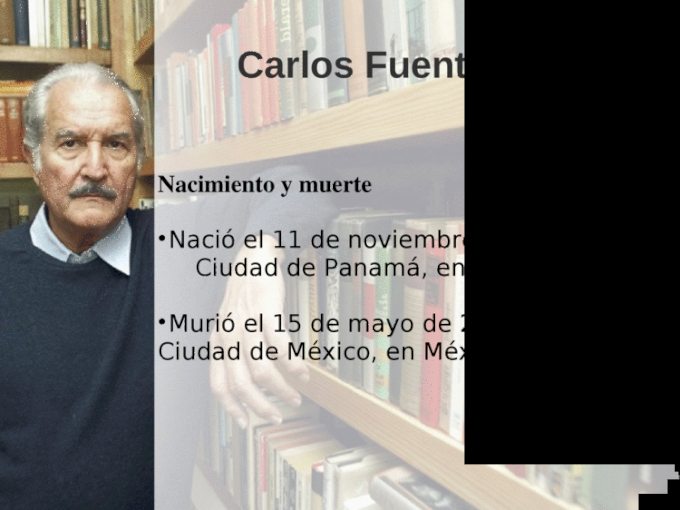
He moved systematically from one country to another, inquiring and then probing more deeply. The conversation was classic Fuentes: He spent two hours exploring Latin American cultural and political reality, questioning this group of Latin American intellectuals about the recent politics and literature of each of their countries. Fuentes sat at the head of the table and tended to lead the discussion. The next afternoon, Fuentes, Aguilar Camı´n, the Argentine writers He´ctor Libertella and Martı´n Caparro´s, the Puerto Rican writer Luis Rafael Sa´nchez, and I had lunch together.

As I watched Fuentes’ eyes light up over our discussion, I realized that, despite the age-old nature of this debate, the questions are as alive today as they were a century ago, when Domingo Faustino Sarmiento defined Latin American identity within the conceptual framework of the simple Manichaean dichotomy between civilization and barbarism. The career of Carlos Fuentes has consisted of a lengthy meditation on this question. These questions have been debated in Latin America, of course, for more than a century. Fuentes, Aguilar Camı´n, Dante Medina, and a group of other participants spent the remainder of the afternoon in the lobby and on the veranda of our hotel discussing exactly what Latin America is: Indian? Spanish? Criollo? Fuentes and Aguilar Camı´n were particularly insistent in recognizing Spain along with the other cultures that have contributed to the makeup of the Americas. The Mexican writer He´ctor Aguilar Camı´n pointed out that the official histories of Mexico include pre-Columbian Indian civilizations, underscoring the contributions of the Toltecs, the Olmecs, the Aztecs, and other Native American groups to Mexican culture, but these Mexican histories have systematically excluded Spanish contributions to Mexico. THE WRITINGS OF C A R L O S F U E N T E SĬame involved in a discussion on Latin American identity. After a presentation on Terra Nostra by the Mexican writer and scholar Dante Medina, Fuentes and our group be. A group of twenty writers and Fuentes scholars met that July to dedicate a week to discussions of Fuentes’ work, with the author himself joining in. The idea for the book in the present form, however, finally came together in July 1992 while I was engaged in a dialogue with Fuentes and Fuentes scholars in El Escorial, Spain. I began writing the biographical chapter in 1989. During that time, I offered three graduate seminars on the fiction of Fuentes and made several trips to Mexico to interview the author and carry out research there. During the late 1980s and early 1990s, I spent several years teaching the writings of Fuentes and thinking about the possibility of writing this book. He has dedicated his lifetime to the further understanding, analysis, and explanation of these cultures and politics.


Consequently, Fuentes received an early and broad education on the cultures and politics of the Americas. Just as Cervantes’ father (a surgeon) took his son along on his travels throughout Castille during the reigns of Charles V and Philip II, giving the boy an early introduction to the politics and cultures of sixteenth-century Spain, Fuentes’ father (a diplomat) took him along on his travels. His work includes more than a dozen novels, several volumes of short stories, numerous essays on literary, cultural, and political topics, and some theater. Smitten by the modernity of Miguel de Cervantes and Jorge Luis Borges at an early age, he has written extensively on the cultures of the Americas and those of other places in the world. La Edad del Tiempo: An Interview with Fuentes APPENDIX IIĪrlos Fuentes is one of the major writers of this century in Latin America. Or He´ctor Aguilar Camı´n, Martı´n Caparro´s, Juan Goytisolo, He´ctor Libertella, Dante Medina, and Luis Rafael Sa´nchezĪn Intellectual Biography: The Journey to El Escorial and Terra Nostra PA R T I I Fuentes, Carlos-Criticism and interpretation.

(Texas Pan American series) Includes bibliographical references (p. The writings of Carlos Fuentes / Raymond Leslie Williams. Library of Congress Cataloging-in-Publication Data Williams, Raymond L. 嘷 ⬁ The paper used in this publication meets the minimum requirements of American National Standard for Information Sciences-Permanence of Paper for Printed Library Materials, ansi z39.48 – 1984. T E X A S PA N A M E R I C A N S E R I E SĬopyright 䉷 1996 by the University of Texas Press All rights reserved Printed in the United States of America First edition, 1996 Requests for permission to reproduce material from this work should be sent to Permissions, University of Texas Press, Box 7819, Austin, TX 78713-7819.


 0 kommentar(er)
0 kommentar(er)
